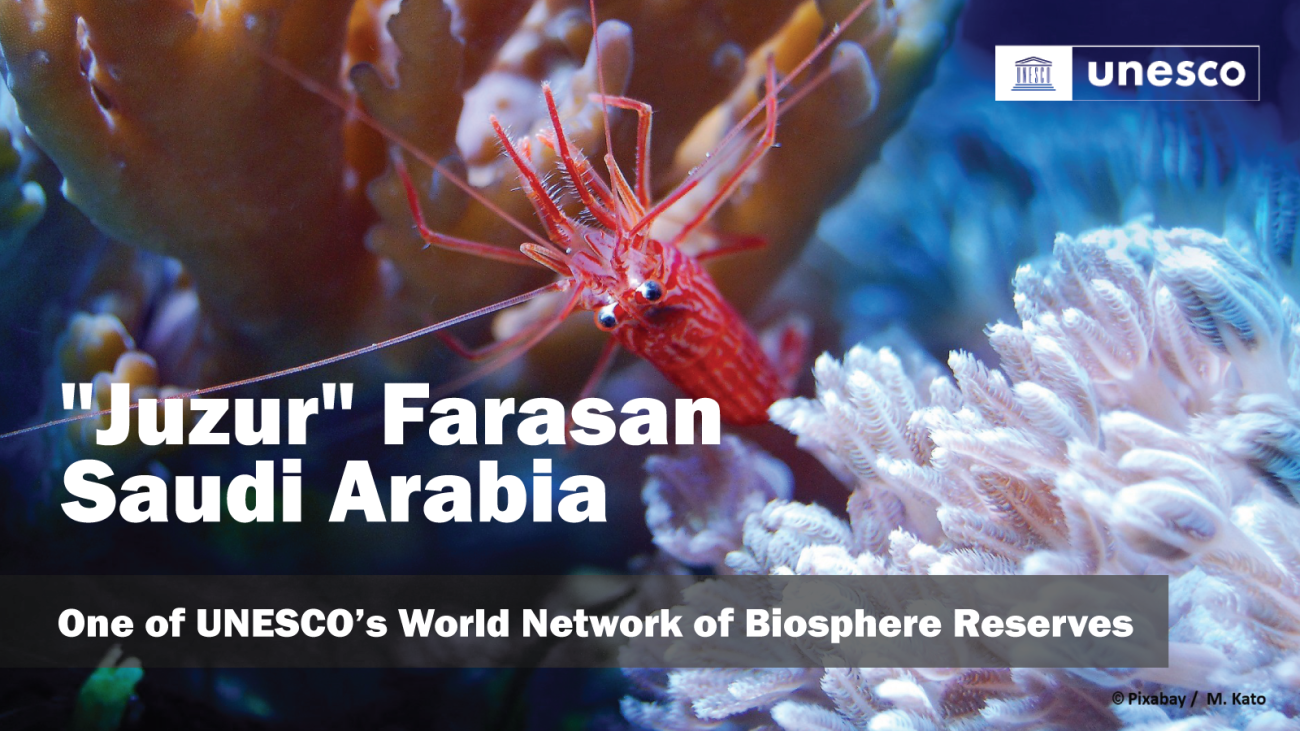"Juzur" Farasan - First Biosphere Reserve in KSA

A landmark for hidden marine and terrestrial gems in the Red Sea
In March 2021, the International Advisory Committee for Biosphere Reserves welcomed the first nomination dossier from the Kingdom of Saudi Arabia of "Juzur" Farasan – as a Biosphere Reserve. The nomination was approved by the International Coordinating Council of UNESCO’s Man and the Biosphere Programme (MAB-ICC) on September 15, 2021 during the commission’s session held in Abuja, Nigeria between September 13 and 17, 2021. This was the first time the MAB-ICC held its session in Africa.
The Islands of Farasan are a cluster of islands in the South Red Sea located in the extreme south-west of Saudi Arabia near the Yemeni border. The biosphere reserve features terrestrial ecosystem occupying only 10 per cent amid a stunning marine environment. The Islands form a mosaic of key biodiversity spots, recognized for their outstanding universal value in the South Red Sea, where the vegetation is typically originated from the Tihamah plain and hills bioregions.
"Juzur" Farasan declared a protected area in 1996 by a Royal Decree, is recognized as one of Saudi Arabia’s prime protected sites. The islands coastlines and surrounding Sea embrace a variety of ecosystems including coral reefs, red and black mangroves, seagrass beds, saltmarshes, and macro-algal reefs. The islands are home to the largest population of idmi gazelle in Saudi Arabia and nesting repositories for pinkbacked pelican, sooty falcon, white-eyed gull, osprey, crab-plover, lesser crested tern, white-cheeked tern, and Red Sea noddy. In the deep sea live the dolphins, whales, dugong, green turtle, hawksbill turtle, and manta ray. Farasan Islands are recognized as Important Plants Area hosting rare and endemic species and holding three of thirteen stands of the threatened red mangrove. The Islands still preserves man-made terraces showing ancestral traditions and agricultural practices which rely on old means of irrigation and small scale fishing.
Being protected since 1996, the management of "Juzur" Farasan capitalized on extensive research and monitoring programmes addressing both terrestrial and marine ecosystems as well as plant and animal species. Its portfolio includes a series of educational and awareness raising programmes targeting local communities including schools, farmers, fishermen, youth, and local leaders. The core area of the biosphere reserve is an active member of the Regional Organization for the Conservation of the Environment of the Red Sea and Gulf of Aden (PERSGA).
The Saudi Wildlife Authority (SWA) has developed a management plan for 2021-2023 that embeds the concept of the Man and Biosphere Programme as a management tool for the transitional period. The integrated management approach links the conservation of the islands’ biodiversity with the sustainable development of resources in alignment with the improvement of their utilization. The future plan of "Juzur" Farasan biosphere reserve is to establish a model for integrated conservation activities and development initiatives whereby [1] the core natural values and attributes are safeguarded along with their associated tangible and intangible cultural value; [2] socioeconomic development is intertwined with the maintenance of ecosystem services; and [3] the biosphere reserve becomes a destination for domestic and international nature-based tourism. The foreseen plan is driven by the emerging new vision of the Kingdom, which aims to promote national and local economic development through the adoption of more diversified approaches to generate income and improve the livelihoods of local communities from emerging development sectors including tourism.

